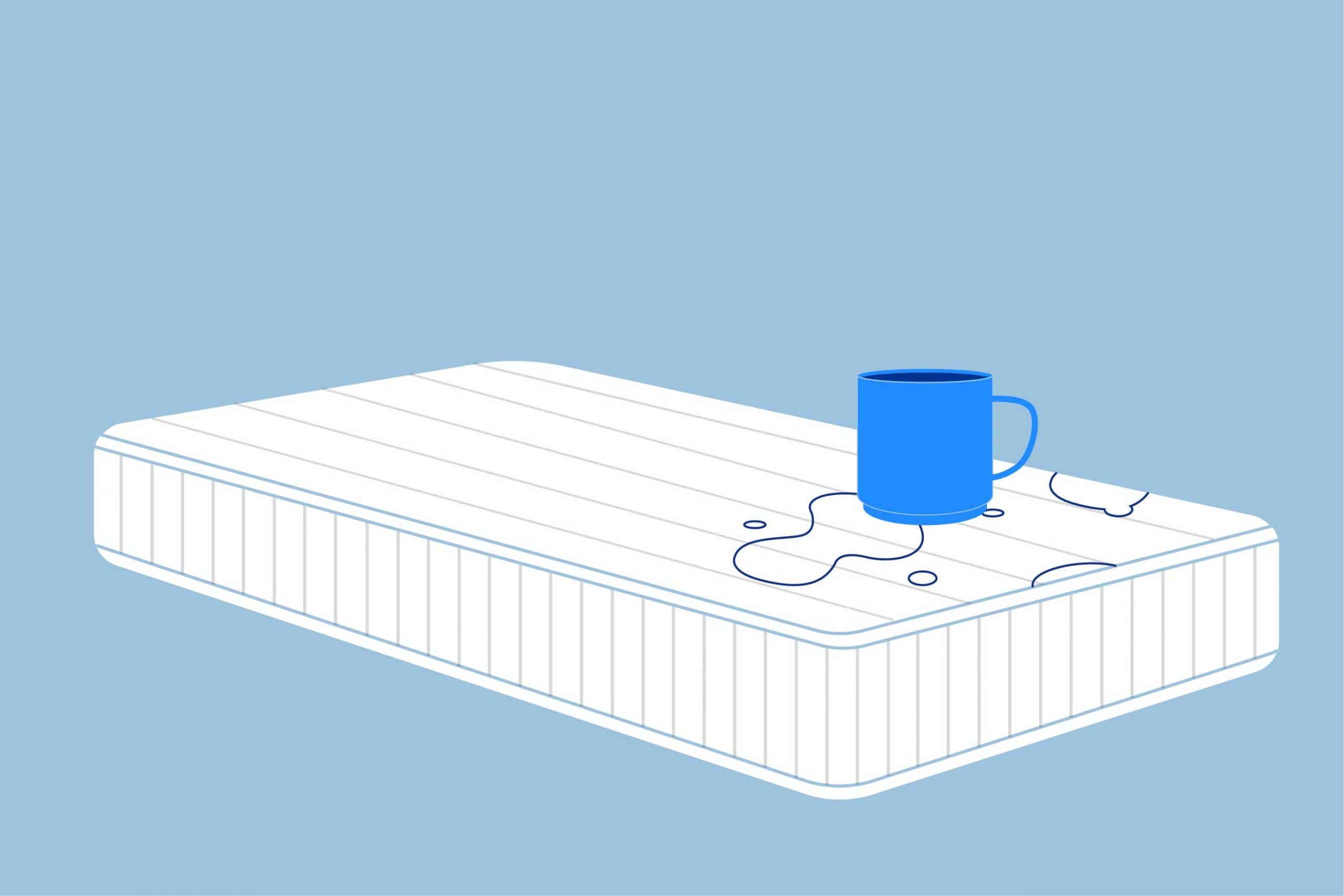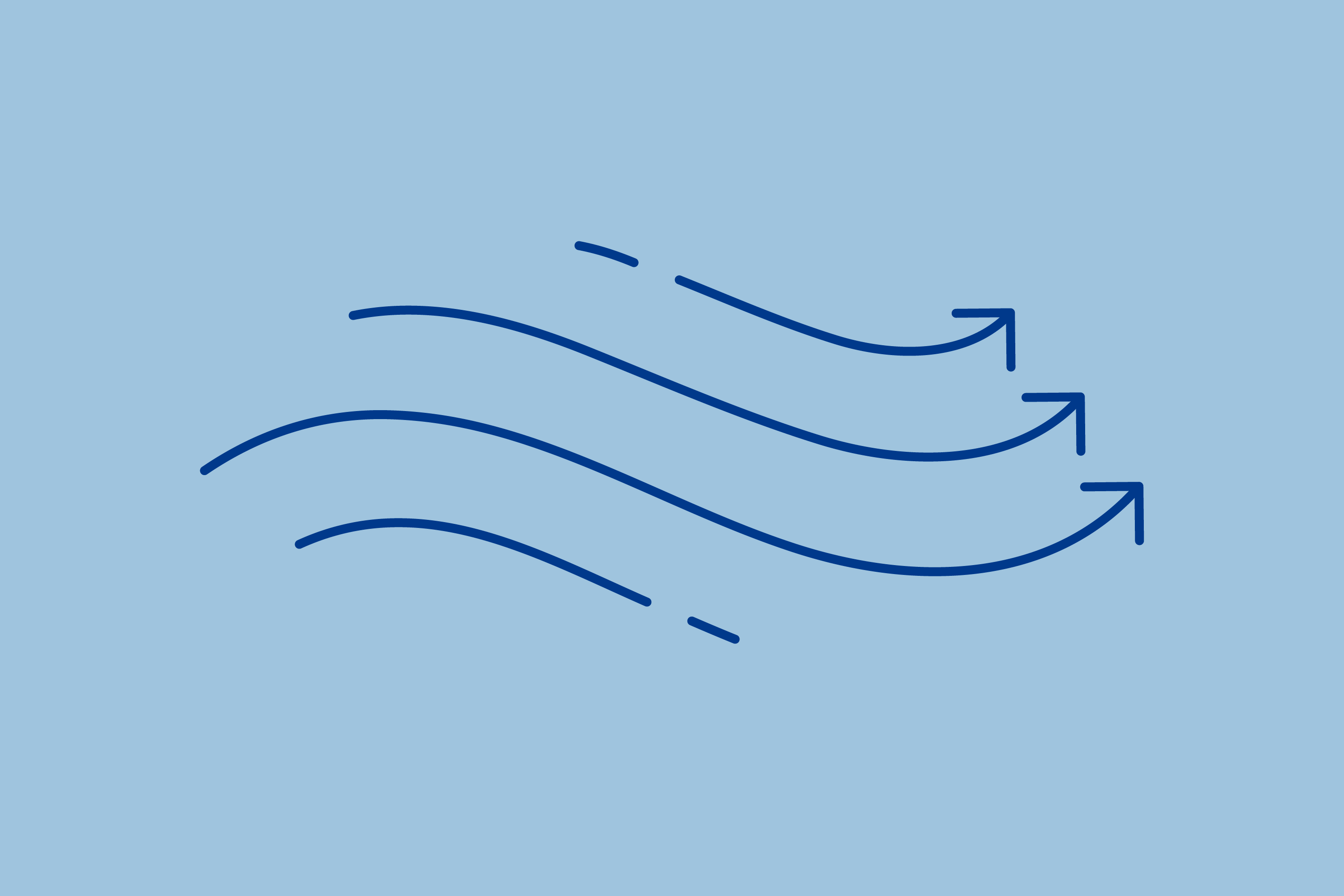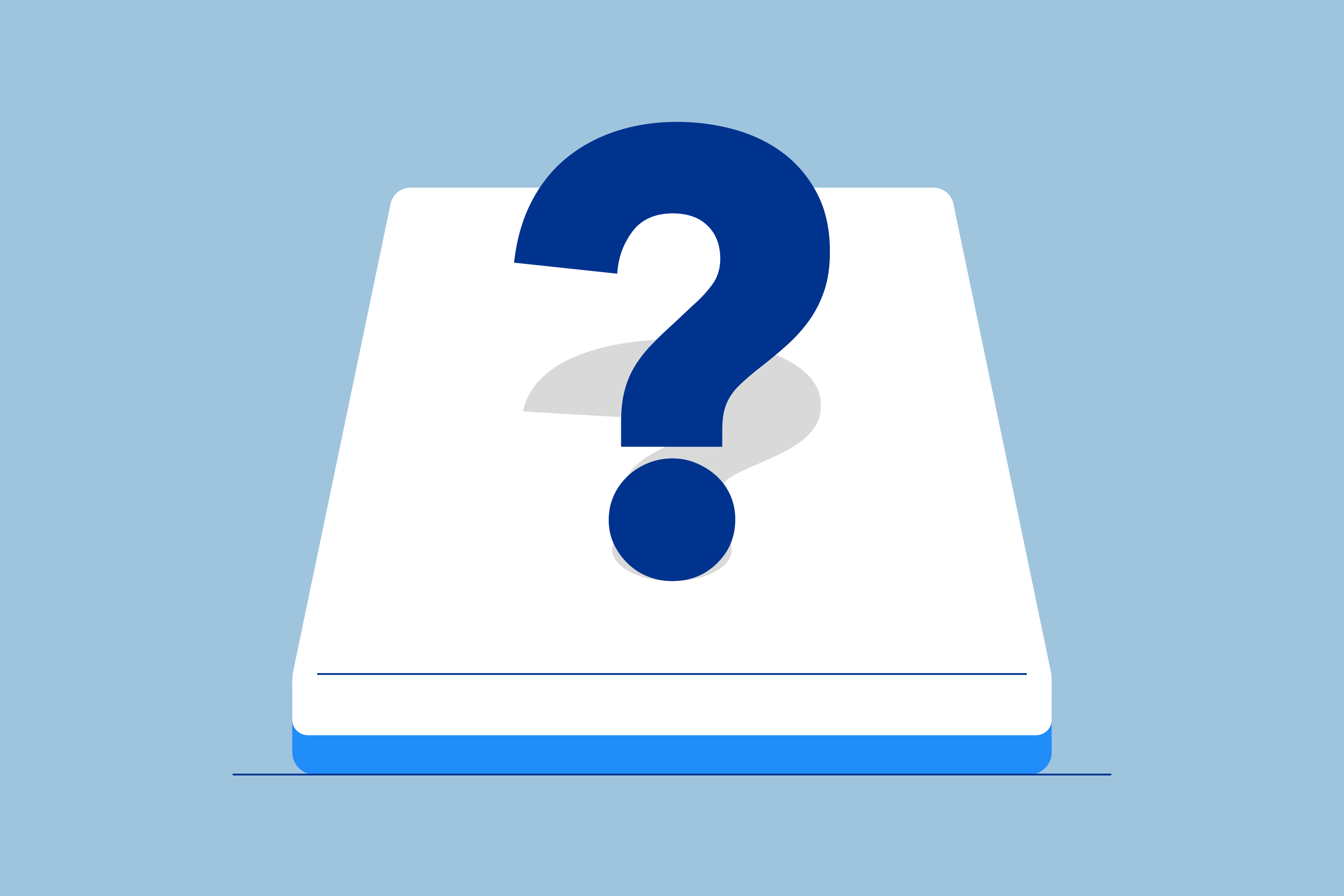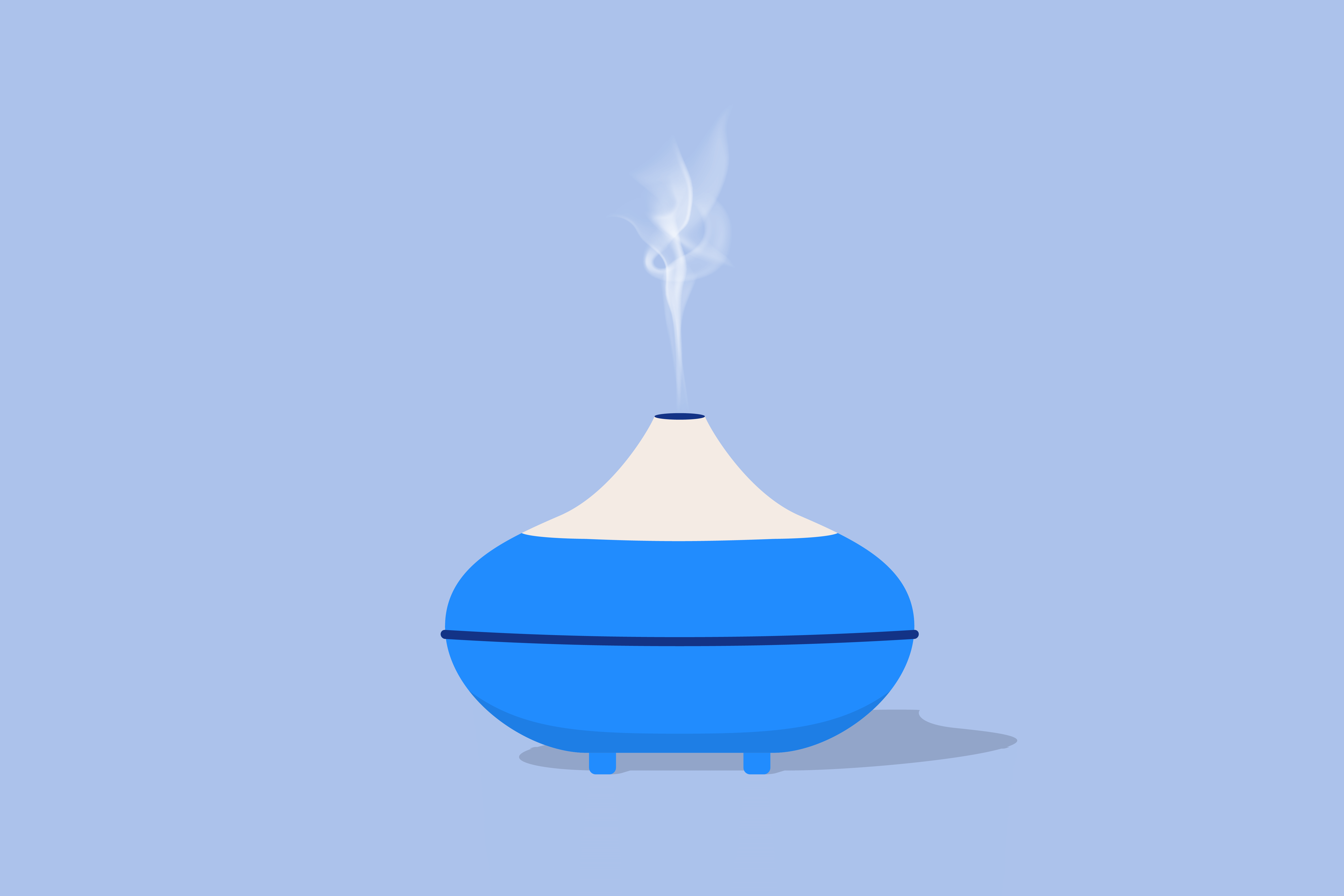Key Takeaways
- Protect Your Mattress with a Mattress Protector: Invest in a high-quality mattress protector to prevent stains and spills. Stains can void your mattress warranty, making a protector an essential investment for the longevity of your mattress.
- Address Stains Promptly with Proper Cleaning Techniques: Act quickly to remove stains using appropriate cleaning methods. Different stains require specific treatments, such as vinegar and soap for coffee stains, enzyme cleaners for blood stains, and hydrogen peroxide for set-in stains. Follow the recommended steps to avoid damaging the mattress fabric.
- Regular Maintenance for a Hygienic Mattress: Rotate your mattress every few months to prevent sweat and body oil accumulation. Wash bedding accessories regularly, vacuum the mattress every 4 to 6 months, and deodorize using a mixture of cornstarch and baking soda. These practices contribute to a cleaner, allergen-free sleep environment and extend the lifespan of your mattress.
You spend 7 to 9 hours on your mattress every night. With time your mattresses may develop stains from accumulated sweat and body oil. Sometimes you may accidentally spill coffee or juice on your mattress which requires immediate cleaning, otherwise, stains may set permanently.
Stains can void your mattress warranty. Mattresses are big investments and you don’t want to risk losing the warranty on it. In this article, we discuss how to get stains off and clean a mattress without damaging it.
Steps to Remove Mattress Stains
Quick Guide: A 30-Second Summary
| Best Stain-Proof Mattress Protector | Amerisleep Mattress Protector |
You don’t need to buy too many things from the store to remove stains from your mattress. A few household items are usually enough to treat tough stains.
How to Treat Common Mattress Stains
While we try to keep our beds clean, they still might get stained. If you have small children in the house, some stains are impossible to avoid. Such accidents can leave a lingering urine stains and smell in the mattress that will need treatment to remove. Other stains from bodily fluids, such as blood, may require a specialized enzyme cleaner.
When removing stains, it’s best to use white or light-colored cloth because dark colors may bleed when dipped in cleaning solutions. Once you remove the stain, let the mattress air dry before following the regular steps of making the bed.
Double-check to confirm there’s no moisture inside the mattress. Moisture leads to growth of mold and mildew.
Coffee
Stain removers: Vinegar, liquid dish soap, laundry detergent
How to remove:
- Put a towel on the spilled coffee to soak in the liquid
- Dampen a dry cloth with warm water
- Blot the stain starting from the edges and moving inwards to prevent spreading
- Dip another clean dry cloth in a vinegar and liquid dish soap solution
- Repeat blotting, starting from the edges
- If your coffee had sugar or cream in it, then dab a mixture of laundry detergent and warm water on the stain
- Let it sit for 5 minutes
- Dab a fresh wet cloth to rinse the detergent
- Blot dry with a clean towel
Urine
Stain removers: White vinegar, ammonia, baking soda, hydrogen peroxide, laundry detergent
How to remove:
- Blot the area with a dry towel
- Mix equal portions white vinegar and water or ammonia in a spray bottle
- Spray on the entire affected area
- Let it rest for 5 minutes
- Blot with a dry cloth
- Sprinkle baking soda all over the area
- Let it rest for 5 to 6 hours
- Vacuum clean the area
Blood
Stain removers: Enzyme cleaner
How to remove:
- Gently blot the blood with a clean cloth or paper towel to absorb as much of the liquid
- Avoid rubbing, as it can push the blood deeper into the mattress fibers
- Test the enzyme cleaner on an inconspicuous area before applying it to the stain
- Let the enzyme cleaner sit for as long as the product label specifies
- Use a clean cloth or a soft-bristled brush to gently blot and scrub the area
- Let the mattress dry
Set-In Stains
- Mix a cup of hydrogen peroxide and a few drops laundry detergent in a spray bottle
- Spray the solution on the affected area
- Scatter baking soda all over
- Let rest for 5 to 6 hours
- Vacuum clean the area
Nail Polish
Stain removers: Nail polish remover and laundry detergent
How to remove:
- Blot with a paper towel
- Use a cotton ball to dab nail polish remover on the stain
- Blot dry the area with a fresh paper towel
- Dab a mixture of laundry detergent and water on the spot
- Let rest for 5 minutes
- Wipe with a damp cloth to rinse the detergent
- Pat dry with a towel
Juice
Stain removers: Hydrogen peroxide and baking soda
How to remove:
- Blot the area dry with a towel
- Spray hydrogen peroxide all over the affected area
- Let rest for 5 to 8 minutes
- Blot the hydrogen peroxide with a dry cloth
- Sprinkle baking soda over the affected area
- Let rest for 5 to 6 hours
- Vacuum clean the area
Oil
Stain removers: Baking soda, cornstarch, and dish soap
How to remove:
- Mix equal portions of cornstarch and baking soda and sprinkle on the stain
- Let rest for 20 minutes
- Use the upholstery attachment in your vacuum to remove the mixture
- If you still see marks, mix dish soap with warm water and dab on the stain
- Let sit for 5 minutes
- Rinse the solution with a fresh wet cloth
- Use a clean towel to blot dry
Yellow Stains
Stain removers: Salt, baking soda, lemon juice, and hydrogen peroxide
How to remove:
- Mix equal portions salt, baking soda, and lemon juice
- Rub the paste onto the stains
- Let rest for 30 minutes
- Brush off the paste
- Remove remaining residue with a damp cloth
- Blot dry with paper towels
Can Mold Look Like a Mattress Stain?
Yes, mold on a mattress can sometimes look like a spreading stain. Mold growth on a mattress can take on a variety of appearances, ranging from small spots or speckles to larger, spreading patches. Mattress mold can also be black, green, white, or other colors, depending on the type of mold and the conditions in which it is growing.
If you suspect that you have mold on your mattress, it’s important to take steps to address the problem as soon as possible, as mold can be a health hazard and may also damage your mattress over time. Usually, the simplest and best solution is to get rid of the mattress entirely rather than try to clean it, as mold cannot be fully eliminated once it’s made its way to the mattress’s interior.
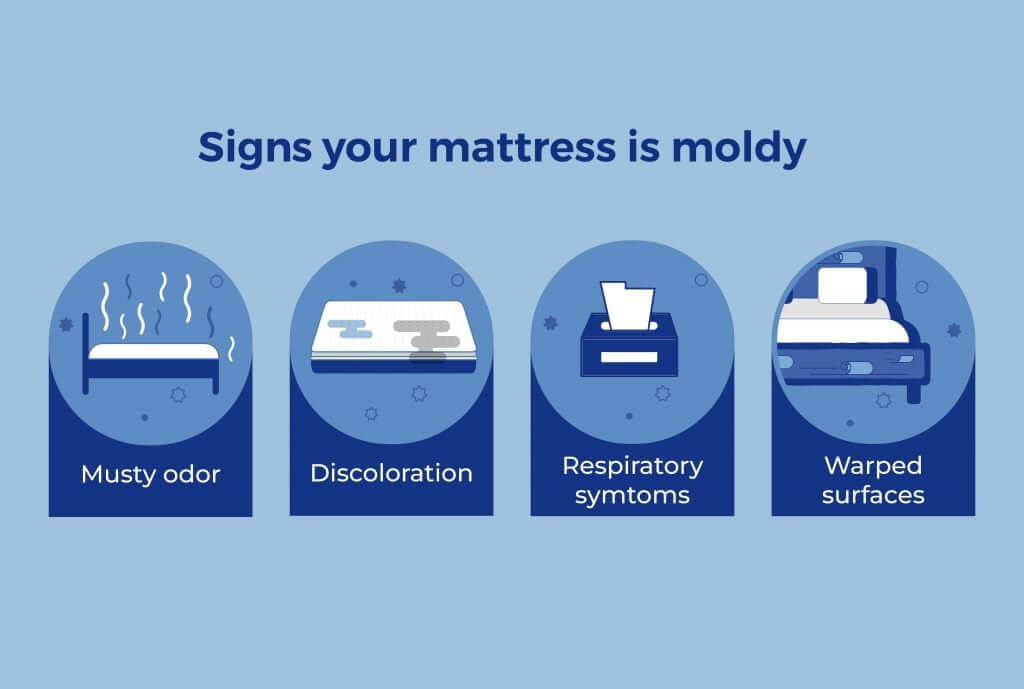
How to Prevent Mattress Stains
You can avoid some stains by being cautious, but yellow sweat stains may still appear. They are usually noticeable after using a mattress for 5 to 6 years.
Use a Mattress Protector
Most mattress protectors are waterproof, preventing liquid from seeping through. They can be easily removed and machine washed on the gentle cycle every two weeks. Mattress protectors are a relatively inexpensive way to extend mattress durability. Plus, they save you the effort of removing stains from your mattress.
Rotate Your Mattress
Rotating your mattress once every three to four months can prevent sweat and body oil from accumulating, causing stains. Rotating the mattress ensures you sleep on different parts of the mattress, reducing stain build-up.
Why Should You Clean Your Mattress?
Your mattress may be a breeding ground for allergens if you don’t clean it regularly. Every normal adult sheds skin cells and considering we spend 7 to 9 hours in bed each night, lots of debris could accumulate and attract dust mites.
Dust mites feed on skin cells and thrive in a warm humid environment. Sweat provides the required humidity for dust mites, mold, mildew, fungi, bacteria, and other indoor allergens to grow.
These allergens trigger symptoms such as watery eyes, runny nose, itchy throat, skin rashes, and breathing difficulties. Allergic reactions cause sleep disruptions, affecting your daytime productivity. Even if you are not prone to allergies, it’s not hygienic to sleep in a bed full of dust and germs. Cleaning your mattress regularly eliminates these dust and germs, keeping your mattress fresh. A clean mattress has a longer shelf life, saving you money.
Steps to Keep a Mattress Clean
Cleaning a mattress takes some time and effort. Following a few simple steps goes a long way in keeping your mattress clean.
Wash Bedding Accessories
Wash bedsheets, duvet covers, and pillow covers every week in hot water. The high temperature kills germs and other allergens. Washing sheets regularly reduces the chances of skin cells and allergens permeating the mattress. Wash pillows and comforters once every four months. Expose them to sunlight for 4 to 5 hours once a month. The sun’s UV rays kill germs.
Just make sure all your bedding is thoroughly dry before it goes back on the bed. Drying a mattress after water damage from improperly dried bedding and such is no easy task, and it’s best to prevent it from getting to that point.
We have a number of guides on the proper washing and cleaning of various bedding:
- How To Clean a Memory Foam Mattress Topper?
- How to Wash and Dry All of Your Pillows
- How to Clean a Comforter
- How to Wash a Quilt
- How Often Should You Wash Your Sheets?
- How Often Should You Wash Your Mattress Protector?
- How to Wash a Body Pillow
- How Long Does It Take to Dry Clean a Comforter?
- How to Make Sheets White with Household Items
Fluffing your pillows and straightening your sheets every morning can also keep them in good condition. Other benefits of making the bed every morning include a boost of productivity after completing a task successfully.
Vacuum
Use your vacuum’s upholstery attachment to clean the entire surface and sides of your mattress every 4 to 6 months. Pay extra attention to the areas beneath mattress seams and headboards, which are prone to accumulating germs. Vacuum your foundation, box spring, or platform bed, too.
Deodorize
Deodorizing your mattress maintains its freshness for longer. Mix equal parts cornstarch and baking soda and sprinkle all over your mattress. Let it rest for 8 to 10 hours. Cornstarch absorbs oil, while baking soda neutralizes odors. Then vacuum your mattress again to clean up the baking soda and cornstarch. Mixing baking soda with your favorite essential oils is also an option to keep the soothing fragrances in your bed for a few days.
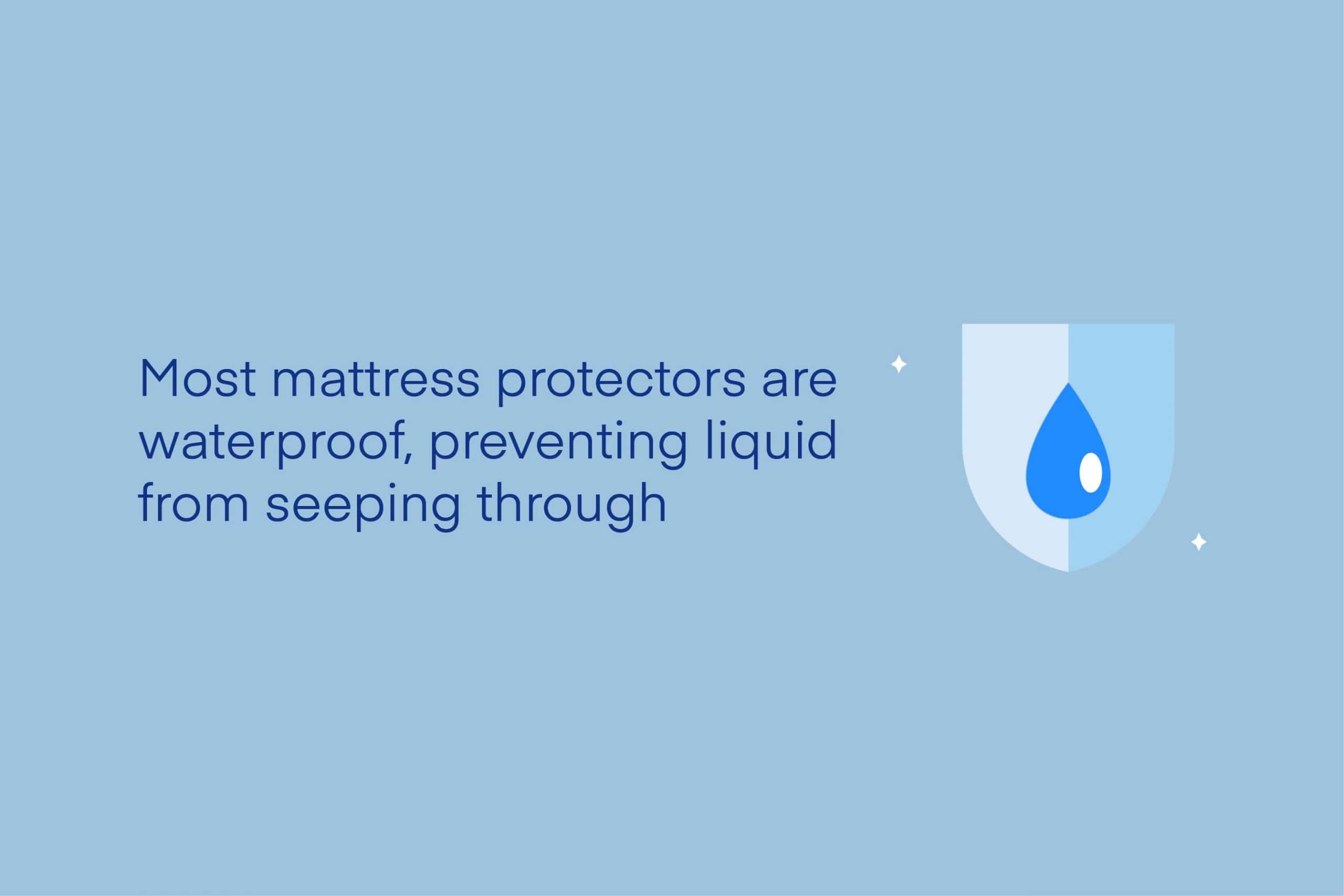
FAQs
Can you use bleach on a mattress?
You can use bleach as a last resort for stubborn stains on white mattresses. Wear gloves while using bleach, and keep windows open for ventilation. Dilute bleach with water in a 1:10 ratio. Spray it on the stain, then blot with a damp cloth. Repeat the same process with plain water to remove any residual bleach.
Can you steam clean a mattress?
Though the vapor steam from steam cleaners removes dust and allergen build-up, it comes with a risk. Moisture set within thick foam may not be detectable from the surface, causing damage to the mattress.
How do you deep clean a mattress?
Mattress deep cleaning includes removing all bedding, vacuuming the mattress surface, sprinkling baking soda all over, letting it rest for 10 to 24 hours, and finally re-vacuuming it to remove all baking soda. It’s best to deep clean your mattress once every 6 months. While deep cleaning, open your windows to expose your bed to natural sunlight. The sun’s rays absorb moisture, making your mattress feel fresh.
Conclusion
The best way to tackle stains is to deal with them as soon as possible. With time, they set into the mattress fabric, making removal difficult. Using a high-quality mattress protector is an easy way to safeguard your bed against stains.
About the author
April Mayer is a sleep expert and writer with a degree in exercise physiology. She has dedicated her career to exploring the relationship between sleep and productivity. Her insightful articles, such as "The Surprising Way Your Mood Might Be Messing With Your Productivity" and "Wake Up to More Productive Mornings," have been featured in reputable publications like Forbes, Greatist, Real Homes, Thrillist, Tom's Guide, and Eat This, Not That. With a passion for helping others lead more productive lives through restful sleep, April offers valuable expertise on foods and vitamins for better sleep. As a trusted member of the Early Bird team since March 2020, she continues to provide informative and well-researched content.
View all posts